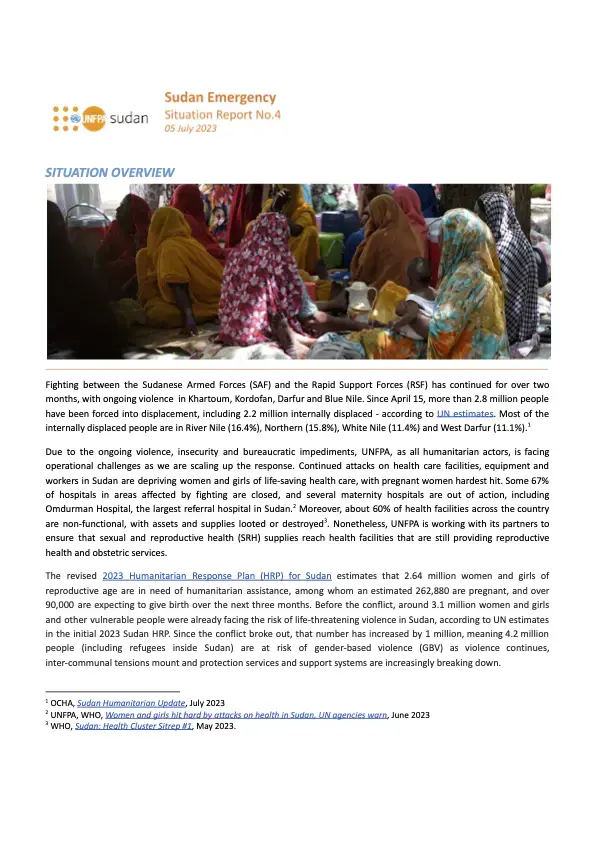Sudan Emergency: Situation Overview
The ongoing conflict between the Sudanese Armed Forces (SAF) and the Rapid Support Forces (RSF) has displaced more than 2.8 million people since it began on April 15, 2023. This includes 2.2 million internally displaced people, with the highest concentrations in River Nile, Northern, White Nile, and West Darfur states. The violence, compounded by insecurity and logistical challenges, has severely disrupted access to essential health services, especially for women and girls. Approximately 67% of hospitals in conflict zones have closed, including Sudan’s largest referral hospital, Omdurman. This has left pregnant women without critical care, with about 60% of health facilities across the country non-functional due to looting, destruction, and shortages of supplies. UNFPA is working with partners to ensure life-saving sexual and reproductive health (SRH) services reach those in need.
The revised 2023 Humanitarian Response Plan (HRP) estimates that 2.64 million women and girls of reproductive age are in need of humanitarian assistance, including 262,880 pregnant women, 90,000 of whom are expected to give birth in the next three months. Gender-based violence (GBV) risks have also escalated, with 4.2 million people, including refugees, at risk. Reports of sexual violence, including rape, sexual exploitation, and domestic violence, have increased, with adolescent girls facing heightened risks, such as child marriage, as families attempt to protect them from sexual violence.
Humanitarian Needs: Sexual and Reproductive Health (SRH)
The ongoing conflict has severely impacted access to essential SRH services, including emergency obstetric and neonatal care (EmONC), particularly in states hosting internally displaced populations. There is a significant risk of a nationwide shortage of life-saving SRH medicines, as access to central medical warehouses in Khartoum, where vital supplies are stored, remains blocked. Prolonged electricity cuts and fuel shortages are further straining health facilities, with many relying on generators to continue life-saving care for pregnant women.
Access to clinical management of rape (CMR) services is critically limited, as attacks on health facilities and ongoing violence make it life-threatening for survivors to seek help. Post-rape kits and Inter-Agency Reproductive Health Kits with essential SRH supplies are urgently needed in functioning health facilities, particularly in states with large numbers of displaced people.
Additionally, the upcoming rainy season, lasting from July to September, poses a substantial threat to SRH services, especially in areas prone to flooding where many displaced people are currently sheltering.
Humanitarian Needs: Gender-Based Violence (GBV) Prevention and Response
GBV risks continue to rise as the conflict escalates. UNFPA is working to strengthen GBV prevention and response efforts in 11 states, but new GBV Working Groups are needed in states hosting newly displaced populations, such as River Nile, Sennar, and Northern State. Women and Girls Safe Spaces and Confidential Corners, which provide essential GBV services, must be established or rehabilitated to meet the needs of vulnerable women and girls.
There is an urgent need to distribute over 260,000 Dignity Kits, which include sanitary napkins for menstrual hygiene management, especially before the flood season. Additionally, GBV survivors often face financial barriers to accessing services. To address this, UNFPA is covering transportation and service costs for survivors, though the ongoing conflict and disrupted banking system present challenges for direct cash assistance.
Over the next six months, UNFPA plans to train 5,000 service providers and 13,000 community members on GBV prevention and response to ensure ethical, confidential support for survivors. Remote GBV services, including helplines and psychosocial support, are also being strengthened to expand access amidst the ongoing conflict.
UNFPA remains committed to delivering life-saving SRH and GBV services, even in the face of significant operational challenges, ensuring the most vulnerable populations receive the care and protection they need.



